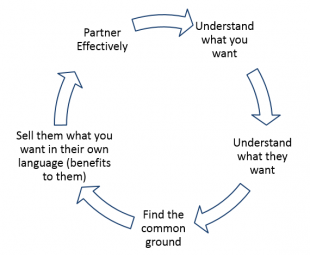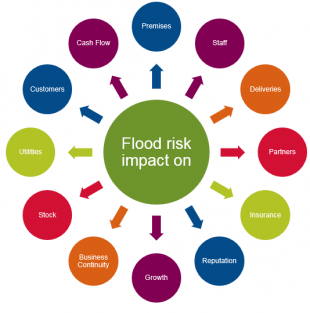I’ve worked for the Environment Agency and its predecessors for over 20 years now. The organisation is always evolving and I like to think I am too.
One of my main areas of recent evolution has been learning how to sell, and I’d like to tell you about it.
If you read to the end you’ll find 3 simple things which will make your role easier.
See, I’ve already sold you the benefits of investing some time in reading this.
Double Glazing
Have you ever bought double glazing, or had the salesman round? If you have, you’ll know that they don’t talk to you about 10mm glass and 20mm air gaps. They talk to you about benefits, and sell those benefits to you. It will keep your kids warmer; your house will be more secure; you won’t have to clean the windows so often, etc. They look at your life and sell you an improvement. Once you’re sold on the idea (the benefits) the cost conversation is much easier to have. It works like this:

Working with others
A couple of years ago my role was to engage with big business to encourage them to be flood aware, by first of all knowing about and then using our flood data. I started off telling them masses about what the data is, dazzling them with facts and figures about computer models and LIDAR accuracies, thrilling them with how much I knew about floods and generally not focusing on them, what they wanted and how I could help them.
It didn’t work that well and was a tough lesson to learn. But I’m not surprised I had to learn it. I have a piece of paper that says I’m a Civil Engineer, so what do I know about selling? I’ve been on a few influencing courses, but I’m not a trained negotiator.
The good news is that you don’t need to be, to increase your impact with businesses or individuals that you engage with, you just need to sell not tell.
Sell the benefits to their business
The Environment Agency’s board recently had a breakfast meeting with big business to help them understand the flood products and services we have available. The aim was to help build and support a flood-ready economy and look for opportunities to develop partnerships. I was asked to help and design the session around the sell-not-tell approach.
One of the main things we used to design the material we presented was this wheel. It helps consider and explore the impact of flooding from the perspective of the businesses we're talking to.

We sold businesses the benefits of being flood aware both in terms of the risks they might need to manage and the opportunities available to them. It’s an effective technique and I believe you could use this to make anyone interested in learning more about flood risk.
The response was extremely positive, and has led to more 1:1 meetings with the type of big businesses that you’d find on most high streets.
Working with these businesses, who I like to refer to as Community Hub Organisations, means we have an opportunity to get our messages out to huge audiences. Not only reaching the business itself but also their staff, customers and suppliers. For example, one of the big businesses has close to 100,000 staff, who I’m hoping we can work with to get an easy and direct route to disseminate our message quickly. It can also help lead to opportunities to work in partnership, whether that’s supporting our flood awareness campaign or looking for ways to reduce flood risk in local communities with the support of Community Hub Organisations.
Get the balance right
When engaging with businesses, it’s important to ensure the balance of the agenda is right. and I’ve found something like this has worked well:
| Item | % of time | Detail |
| Introduction | 5% | Give them faith you / your organisation are an expert, peak their interest |
| Current Risk | 40% | How does it impact on all the parts of their business, use the wheel |
| Options to manage risk | 5% | What you are doing about it / what you can’t do / what you could do together |
| Opportunities | 40% | How taking certain actions could help contribute towards their business objectives |
| Next Steps | 10% | Agree the actions and when to follow up |
So ensure the bulk of the discussion is about them, not about you, and I think you’ll stand a better chance of working together.
So what about data, then?
Well it’s all about data really.
Our open data flood maps enable the conversation by identifying the risks. The wealth of other open data on risk gets you through the door, because you have something they can access for free, which is of huge value to the business. We can even provide the business with free flood warnings (also open data).
Couple this with information available on flood planning and mitigation, and you have a great offer – a great product to ‘sell’ – to the business. The data may be free to access, use and share as open data, but there will be some cost in the business beginning to use it in their operations, because doing anything new in business costs either time or money. That’s why it’s important to sell – not tell them about – the benefits, so they can see they outweigh the cost of adopting new practices.
We have to show them where the data is and help them understand how to use it for their purposes, but don’t forget that not everyone uses data or digital the same way you do.
And the 3 simple things?
- Open data opens doors
- Think like the person you are trying to persuade
- Realise you’re selling benefits and opportunities, and learn how to do it
You shouldn’t do things just because someone tells you to.
Don’t expect others to, when you tell them.
Find out about them and start to sell.
Recent Comments